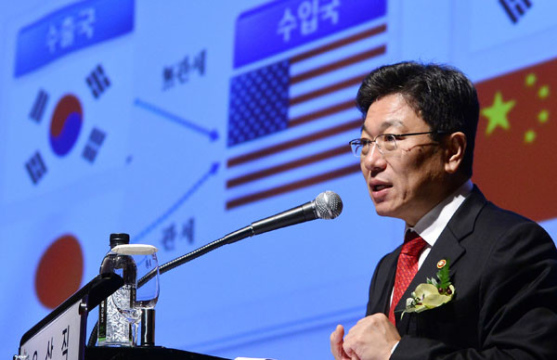
Mexican vs Chinese Factories
With the rising cost of wages in China, manufacturers are increasingly considering Mexico an attractive location to ‘re-shore’ production.
This post is also available in: Spanish
What will it take to bring significant changes to education policy in Mexico? What will be President Enrique Peña Nieto’s new education agenda? Claudio González and David Calderón, president and general director, respectively, of Mexicanos Primero, the country’s leading civil society watchdog working on education, addressed these questions and more on November 29 at the Inter-American Dialogue. Jeffrey Puryear, co-director of PREAL and vice president for social policy at the Dialogue, moderated the discussion.
“Education will be crucial to the new government’s efforts to grow the economy, strengthen democracy, and reduce poverty,” argued Puryear. There is a clear need to move quickly and in the right direction.
According to González, the two main concerns are the low quantity and quality of education. In terms of quantity, González offered a grim diagnosis. While in the United States a person studies on average 13.3 years, in Mexico the figure drops to 8.6 years. Out of 100 children starting basic schooling, 62 will graduate from primary school, 45 will complete middle school, 27 will finish high school, and only 13 will complete college.
However, according to González, quality is the more important of the two. Mexico did poorly in the 2009 PISA (Programme for International Student Assessment) math exam, ranking 49th among 65 countries. González noted that the young generations are not learning much: “Although we are getting better results over time in PISA, the situation is inertial. We are not going forward fast enough. At the rate that we are moving in math we would reach the OECD average in 50 years. In reading comprehension it would take 170 years–if and only if the other countries remain static.”
Calderón discussed why schooling is poor throughout the region. “Education is foremost the right to be yourself, and this country [the United States] was founded on that right. On the other hand, our societies [Latin America] were born out of predatory expansion, a system of control…it is deep in our societies to have a suspicion of learning. There’s a tradition to not respect choices. We must overcome this tradition.”
As for recommendations of what needs to be done to promote real change, Calderón mentioned two major goals and four pathways for the 2012-2024 timeframe. The first goal is to have everyone complete 12 years of education, while the second one is to do so successfully. “In 12 years from now [2024], we hope to reach 85 percent high school graduation rates; now it is just at 27 percent.”
The pathways include putting the state back in charge of education, providing effective teachers, making spending transparent and efficient, and promoting school autonomy.
The speakers ended the discussion by calling for investment in teachers as well as an agreement between state and federal governments regarding their respective responsibilities. Their main request to the new administration is that the state take control of education back from the teachers’ union, as Peña Nieto said he would do. González argued that the new minister of education needs to be a transformational figure: “More of the same is simply not the solution; we have a failed system, we have to transform, to revolutionize our education system.”
The goals and pathways can be consulted in more detail in Mexicanos Primero’s special 2012 report “Ahora es cuando” (Now is When). (Click here for slides of the report, here for the full report in Spanish, and here for the executive summary in English).
Please click this link to view a short interview of David Calderón, conducted by Voz de América.
Supplementary News Coverage:
With the rising cost of wages in China, manufacturers are increasingly considering Mexico an attractive location to ‘re-shore’ production.
South Korea’s entry into the TPP will promote stronger cooperation between South Korea and Latin America.
Mexican civil society organizations and individuals are pressing for education reform, including reducing the Teachers’ Union.
